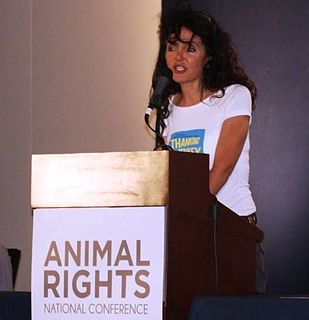A Quote by Ellen Page
Why are vegans made fun of while the inhumane factory farming process regards animals and the natural world merely as commodities to be exploited for profit?
Related Quotes
An environmentalist can oppose factory farming because it's reckless stewardship. A conservative can oppose factory farming because it is destructive to small farmers and to the decent ethic of husbandry those farmers live by. A religious person can oppose factory farming because it is degrading to both man and animal - an offense to God.
What the meat industry figured out is that you don't need healthy animals to make a profit. Sick animals are more profitable... Factory farms calculate how close to death they can keep animals without killing them. That's the business model. How quickly they can be made to grow, how tightly they can be packed, how much or how little can they eat, how sick they can get without dying...We live in a world in which it's conventional to treat an animal like a block of wood.
Some of us seem to be born with a drive to try to make the world kinder. In my twenties, living in New York City, I worked in a soup kitchen every Sunday for many years, just trying to do my part. Then I read Animal Liberation and learned about factory farming and the killing of animals for oven cleaner and realized nobody needed my help as badly as the animals did.
But 'why then publish?' There are no rewards Of fame or profit when the world grows weary. I ask in turn why do you play at cards? Why drink? Why read? To make some hour less dreary. It occupies me to turn back regards On what I've seen or pondered, sad or cheery, And what I write I cast upon the stream To swim or sink. I have had at least my dream.
Farms, whether small or large, are places where slaves are kept. The animals are fattened up to be eaten, or exploited for their ability to make honey or milk, or for their fur, wool or body parts; they are kept as breeders to produce more animals who can in turn be exploited and ultimately sold, slaughtered, and eaten.
A monopoly granted either to an individual or to a trading company has the same effect as a secret in trade or manufactures. The monopolists, by keeping the market constantly understocked, by never fully supplying the effectual demand, sell their commodities much above the natural price, and raise their emoluments, whether they consist in wages or profit, greatly above their natural rate.


































